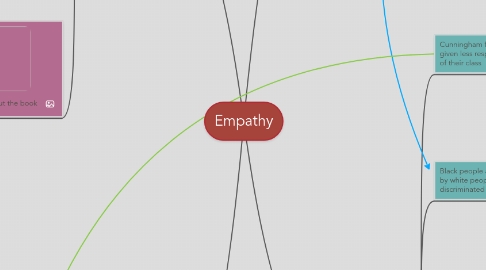
1. Maturity
1.1. Bravery
1.1.1. Atticus Shooting the mad dog
1.1.1.1. "In a fog, Jem and I watched our father take the gun and walk out into the middle of the street... The rifle cracked. Tim Johnson leaped, flopped over and crumpled on the sidewalk... He didn't know what hit him." ( ch 10, pg 9)
1.2. Courage
1.2.1. Mrs. Dubose and her fight against the morphine addiction
1.2.1.1. "I wanted you to see what real courage is, instead of getting the idea that courage is a man with a gun in his hand. It's when you know you're licked before you begin but you begin anyway and you see it through no matter what. You rarely win, but sometimes you do. Mrs. Dubose won, all ninety eight pounds of her. According to her views, she died beholden to nothing and nobody. She was the bravest person I ever knew." (ch 11, pg 115)
1.3. Morals Taught By Atticus
1.3.1. Atticus tells Scout to not fight with people and learn how to mature
1.3.1.1. "Atticus had promised me he would wear me out if he ever heard of me fighting any more; I was far too old and too big for such childish things, and the sooner I learned to hold in, the better off everybody would be." (ch 9, pg 77)
1.3.2. Atticus told his kids to leave Boo Radley alone
1.3.2.1. “Stop tormenting that man”(ch 5, pg 50)
1.3.2.2. "What Mr. Radley did is his own business" (ch 5, pg 50)
1.4. Scout matures throughout the book
2. Small Town Life
2.1. The Cunninghams
2.1.1. "That’s okay, ma’am, you’ll get to know all the county folks after a while. The Cunninghams never took anything they can’t pay back." (ch 2, pg 20)
2.2. The Boo Radley rumours are well known across the town
2.2.1. "Boo bit off his mother's finger one night when he couldn't find any cats or squirrels to eat." (ch 1, pg 13)
2.2.2. "He dined on raw squirrels and any cats he could catch." (ch 1, pg 13)
2.3. Old Fashioned racist values and mindset
2.3.1. Black people are despised due to history of slavery
2.3.2. “In our courts, when it’s a white man’s word against a black man’s, the white man always wins” (ch 23, pg 224)
2.4. Small town life magnified the great depression
2.4.1. "There was no hurry, for there was nowhere to go, nothing to buy and no money to buy it with, nothing to see outside the boundaries of Maycomb County." (Ch 1, p. 6)
3. Justice
3.1. Perspective of black people
3.1.1. Atticus tries his best to defend Tom even though he has no chance.
3.1.2. Nobody else believes Tom is innocent
3.2. Atticus telling his kids to not disturb the Radleys
3.2.1. “What Mr. Radley does is his own business.” (ch 5, pg 50)
3.2.2. “Stop tormenting that man” (ch 5, pg 50)
3.3. Atticus made Jem read to Mrs. Dubose
3.3.1. "Yes, that's what they were. Most of the time you were reading to her I doubt if she heard a word you said. Her whole mind and body were concentrated on that alarm clock. If you hadn't fallen into her hands, I'd have made you go read to her anyway. It may have been some distraction." (ch 11, pg 115)
3.4. Justice through court as Atticus defends Tom
4. Prejudice
4.1. Cunningham family are given less respect because of their class
4.1.1. Scout before she matured
4.1.1.1. "He ain't company, Cal, he's just a Cunningham" (ch 3, pg 25 )
4.1.2. Aunt Alexandra speaking about the Cunninghams
4.1.2.1. "Because—he—is trash, that's why you can't play with him. I'll not have you around him, picking up his habits and learning Lord-knows-what." (ch 23, pg 228)
4.2. Black people are not like by white people and are discriminated
4.2.1. "There's four kinds of folks in the world. There's the ordinary kind, like us and the neighbors, there's the kind like the Cunninghams out in the woods, the kind like the Ewells down at the dump, and the Negroes." (ch 23, pg 230)
4.2.2. Get treated poorly and don't get paid much for work
4.2.3. Seperated from the rest of the population
4.3. Mayella Ewell is judged by her family name
4.3.1. She is mistaken and is lonely
4.3.1.1. "...it came to me that Mayella Ewell must have been the loneliest person in the world. She was even lonelier than Boo Radley, who had not been out of the house in twenty-five years." (ch 19, pg 195)
4.3.2. The geraniums show her desire to be better than an "Ewell"
4.3.2.1. "Against the fence, in a line, were six chipped-enamel slop jars holding brilliant red geraniums, cared for as tenderly as if they belonged to Miss Maudie Atkinson, had Miss Maudie deigned to permit a geranium on her premises. People said they were Mayella Ewell's."(ch 17, pg 173)
4.4. Dolphus Raymond is judged because he prefers the company of cooured folks than white people
4.4.1. "I try to give 'em a reason, you see. It helps folks if they can latch onto a reason... folks can say Dolphus Raymond's in the clutches of whiskey--that's why he won't change his ways... that's why he lives the way he does." (ch 20, pg 204)
4.5. Boo Radley is excluded because he is different
4.5.1. "Every night sound I heard from my cot on the back porch was magnified three-fold; every scratch of feet on gravel was Boo Radley seeking revenge, every passing Negro laughing in the night was Boo Radley loose and after us; insects splashing against the screen were Boo Radley's insane fingers picking the wire to pieces..." (ch 6, pg 57)
4.5.2. "People said he went out at night when the moon was down, and peeped in windows." (ch 1, pg 9)

